#and that you feel very gifted this holiday season :DDD
Text
How the Ghosts Stole Christmas: Old Tricks and New Lessons
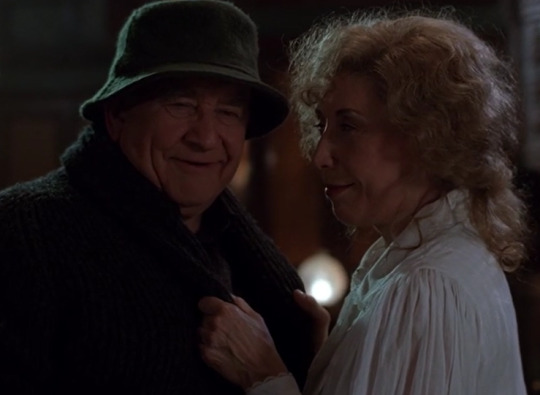
(Dedicated to @welsharcher~! Merry Christmas!)
It's not a stretch to assume Maurice and Lyda were set up as Mulder and Scully's mirrors-- they wore strikingly similar (if more dated) outfits, exhibited the same faults, and learned the same lessons as their visitors.

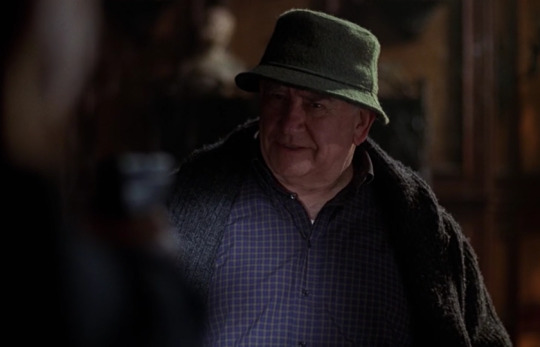
The difference between the two couples--and let's not make bones about the intent of the episode-- is that Maurice and Lyda have tossed care to the wind, openly cultivating their twisted bond forever while Mulder and Scully still dance around that hallway moment and that medicated slip. The dichotomy provides an excellent opportunity for metaphorical analysis, true; however, I find it more interesting to look at the direct contrast the writers put forth quite baldly (y'know, the tantalizing elephant in the room pointed to, over and over, with glee.)
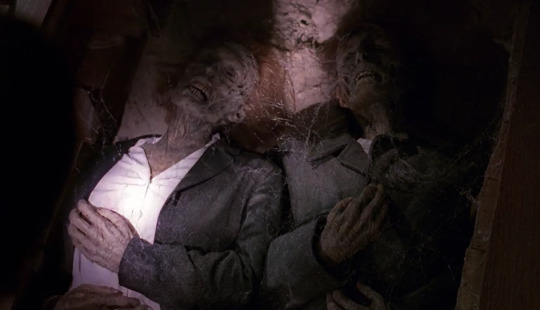
Even though Maurice and Lyda openly admit their love for one another, How the Ghosts Stole Christmas exposes how puddle-deep that love truly is (or was.) Both of them, lost in the throes of woe and despair, thought they would lose each other in this life; and the only way to permanently tie themselves to the other was in death. And now, Maurice must spout pop psychology drivel while Lyda mourns the loss of his beauty and her amusement. It's a selfish love motivated by pride and vanity: two people who figured life offered nothing to humanity except despair and betrayal gave it up, spending their afterlife projecting that worldview onto others (ala Tithonus.) Their delight at tricking, conniving, and one-upping-- if only for one night-- distracts them from the consequences of their reckless conclusion. It gives Lyda and Maurice a point to drive home: that they were right and everyone else is wrong or is too high on love to realize it. They are the only two who have discovered the truth, and everyone else is crazy.
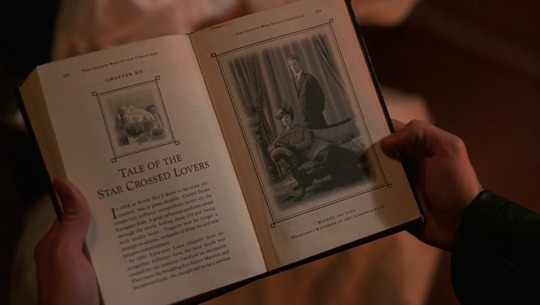
As opposed to Mulder and Scully: yes, our intrepid agents have spoken their love only in coded language and heavy gazes (and once after nearly drowning), but they have a greater weight to the unspoken declarations of their passion and devotion compared to the old ghosts exorcising their frustrations through bloodlust and sadism-- they have trust.
Not just as partners in the work, but as two humans who would go to any lengths to save the other's life, at least for another day.

At first, the ghosts view their guests as naive, altruistic nut cases unwilling to accept the harsher realities of life (and afterlife.) However, over the course of the episode, Maurice and Lyda resign themselves to the fact that Mulder and Scully's ability to communicate-- ironic, I know-- who they are and what they mean to each other dwarfs whatever trite point their hosts were trying to prove; and that softens the ghosts' nonexistent hearts enough to fan the flames of their own romance into purer, truer veins (i.e. not needing two dead bodies between them to feel closer and romantic.)

All in all, the ghosts' lessons were turned right back around on them: Lyda's self-righteous, narcissistic pleasure was taken from her, and Maurice's joy at proving everyone wrong in life was stripped from him... but neither, really, seemed to mind. Maybe, perhaps, they rediscovered the happiness they failed to achieve in life: that of another (cold) hand to cling to on that very special Christmas day. Maybe that realization was enough to break the curse; or maybe they'll stick around to haunt another night.
Despite speculation, it's clear that Maurice and Lyda are content for the first time in a long, long while, reveling in the Christmas spirit with festive happiness and peace on earth.
A marvel for both of them.
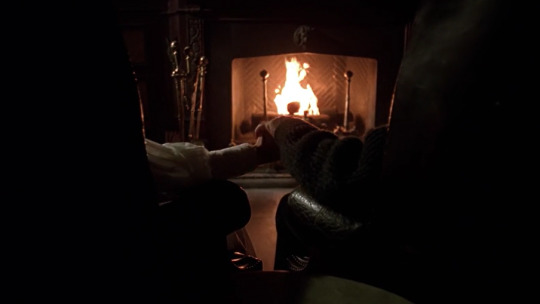
Thanks for reading~
Enjoy!
#txf#Maurice and Lyda Learn Their Own Lessons#Merry Christmas welsharcher!#I hope this makes your little opossum heart happy~#and that you feel very gifted this holiday season :DDD#mine#HTGSC#S6#meta#Mulder#Scully#Maurice#Lyda#xf meta#thoughts#analysis#randomfoggytiger Christmas#2023
25 notes
·
View notes
Note
Can we get more detail about the Christmas party at the end of ILM, since tis the season? Any info about future Christmases?
Sure! What would you like to know? Just skimming through the time, I know I have mentioned some of these before, but:
Anna arrived and tackled Michael /through/ a wall because she thought he was hurting her son. This is how they met. Wildly, they vibed well after.
Anna recognized Philip immediately and was all “:DDD!!!!” And he was all “ (’•n•`;)” and got hug jumped with no gd clue why or that he knew her. Anna was ecstatic to see him again. Philip, after hearing how she met him, regained a few orphaned memories of the event lile he did being captured in the lab, and while not anything like a full recolection, was very happy to get a little back.
They put on Dirty Dancing the second to last day of the trip, and it was amazing. Made some super basic quick sets out of stuff in the house, and did costumes, and it was goofy but amazing and they worked hard and it’s a treasured memory for everyone. (Also it was a ton of intensive training. Joey was excited he made it into group dance cutoff and was super happy. Also the ‘rents and various family greatly enjoyed. It was recorded from multiple angles, too, and Jane edited a cut with various imput (mostly from Ace and Meg), and they all have dvd copies. It’s a fun goofy holiday rewatch now.
Massive dinner. With like, a wildly varied buffet with a ton of different cultural backgrounds. Everything was amazing but Adam did a hot pot that went empty almost immediately and then was requested every year after and he doesn’t talk about it but it made him really happy because he worked hard learning to do that in prep and even Min and Jane who have the most refined pallets liked it a bunch. Incredible mess from making desserts and decorating them. Jeff is baked goods king.
Stuff was easier with Legion, but still kind of awkward. It was okay though, and sometimes really good, and it was sucessful enough to be an important and valuable memory to the lot of them.
Philip’s family had a bunch of fun and got to meet everyone else for the first time (had met quite a few before but it was the first time with everyone). Isa absolutely roasted his brother and Philip died but he’s okay now. Sometimes siblings just be like that and what can you do. Mostly, he was just incredibly thrilled to see them and have good stories to tell and to have enough money himself to help the people he loves financially and buy nice gifts a little too. Philip made a bunch of his gifts by hand because he is very good at sewing, and his gifts are always increidbly popular.
Most of the gang in attendance played live mafia in the Indiana House and it was the wildest fucking thing it went way too hard people were losing it like they were in a world championship or shooting an impromptu horror film. They all had a ball and almost everyone was like “Yo lets do it again 👀.” (When I say they went hard I mean one time Jake was a killer, from upstairs saw Kate making a run for the safe room on the ground floor, and he fucking jumped off the second story onto her to get her and could easily have injured either of them but I mean it’s Jake and Kate so they were fine but like. It was that level of unhinged almost from the start. Ace had a terrifying like Wicked Witch of the West classic scream laugh he did both as killer and when found to startle the killer and it was both horrifying and incredibly effective. Meg saw him do that to Tapp once and she laughed so hard she cried bc of his reaction).
Big old OG campfire style blankets and pillows on the floor slumber party Christmas Eve. :’-] The OG crew always kind of misses the community vibe they so crucially depended on, and they feel really safe and happy when they get to relive it. They need it sometimes.
Uhhhh as far as future Christmases go, most of the time they meet in the Indiana house for tradition, but sometimes they gravitate around to other places. They got a nice heavy snow a few years in and the young adults made huge snow forts and tried to kill each other in snow battle, and Joey prooved to be an especiallly acomplished snow engineer.
It’s always a big occassion, as are any holidays or events the fam can possibly claim as an excuse to meet up. A lot of them start to develop little traditions, like Meg, Jake, Nea, and Fenf putting up lights on the roof and trees in the most wildly reckless ways possible just climbing on shit chucking lights. The old feral friends crew needed to live their best lives, so they sure do.
The animals get more used to each other the longer the meetups happen. Alex and Michael Cat have a wild almost rivalry friendship going. Also, Alex likes to give Jake gifts and often steals them from other people. Sometimes it’ll be super weird stuff nobody has any idea where it comes from, like one time she gave him a knife (like a little snapped pocket knife blade) and Jake almost lost his shit when his crow came swooping at him cawing excitedly and wielding a blade directly at his arm 🔪. Michael Cat is obsessed with Claudette because she saved him once and always does like an excited announcement myrrp when he sees her and scampers over and just climbs up whatever she is wearing and latches to her top and purrs like the world’s best living brooch for a minute or two. She is used to it now and it makes her very happy.
Overall, they’re just very happy. Sometimes stuff messes up, or people can’t be there, but usually, Christmas is one of several times everybody like including extended fam gets to see everybody else, and so it’s a big favorite time of year. It’s home. :’-) 💙🎄
#ask#anonymous#ilm spoilers#One time they played a hide until found game and Susie wrapped herself in a present and nobody found her legend#in living memory (fic)#in living memory#dead by daylight
12 notes
·
View notes
Text
My Opinion on Who’s Driving Whom?
With a teleological orientation towards the hiring of software chauffeurs, the safety of our children, grandparents and lovers will be in the hands of data scientists and statisticians. The "track record" for reducing a human life to a dollar was already made apparent in cases like the Ford Motor Co. and Its Rollover-prone SUV, Chrysler and Its Gen3 Seatbelt, and to mention Toyota and Its Weak Roof. Let’s see if we can change that.
> Under federal law, car manufacturers and auto part suppliers are liable for injuries, damages, and deaths caused by defective cars and dangerous auto parts. Surviving relatives and victims of defective cars can file product-related lawsuits against manufacturers who failed to provide safe vehicles to their consumers.
I want to encourage healthy conversations and debunk some dangerous assumptions. Anyone that has driven a vehicle must think about what it means to relinquish control. Conversations on this transition from the automobile to the driverless-car are so important, cultural in fact. In fiction, the narratives that the open road takes remind me of Grapes of Wrath, Thelma and Louise, and Zen and the Art of Motorcycle Maintenance, each representing a degree of exodus from the confines of individual predictability. The road less travelled and absence of A to B monotony will soon fall under moment-to-movement dictates of algorithms and statistical averages. Now is the time for ethical and moral evaluations. More than a gesture of empty appreciation there is justification in my words of thanks. This conversation is about control and the relinquishment of said control. *For-me*, this blog is an opportunity to voice this concern and for all of us to *forme* new cultural norms built on the lessons learned from the past. The present is our future, a gift if you pause and think about the irony.
Let's consider the concept of autonomy and what control means to the individual. What is at stake when we give up this control? Some of our basic intuitions are correct. For example, rates of pedestrian deaths spike during the holiday season as well as during the seemingly sweet days of summer. Holiday season deaths could be partially attributed to weather but the tightly banded spike during the holidays is heart-wrenching to consider, especially if we imagine the same outcome in our own lives or what horror a motor vehicle death means to these individual families with a lost loved one. In 2016, there were almost 38,000 deaths as a result of motor vehicle accidents in the United States.[^2] This number is rising. Armchair social science speculators attribute the rise to device distracted driver (DDD). Remnants of an alcohol-preserved society reduced alcohol-related fatalities with a designated driver, socially accepted, the outliers to the lawful compliance find themselves violating the designated driver (DD) social norm. Straying from this norm gives all intoxicated operators licence to murder and has been recognized by our justice systems as such an act of volition if the autonomous agent gets behind the wheel.
Bent earthward we are like heliotropic plants, tethered to our data exhaust and deterministic devices. More than less (more-or-less) drivers are distracted by not only by the devices we worship but also the increase in, and legalization of, marijuana. I am not saying that more pot smokers are driving vehicles but the societal perception of its consumption is changing, the effects of which will manifest in a multitude of ways. We are looking at a moving target of safety with lives hanging in the balance.
Let's talk about the predictions. Once the complete and full adoption of self-driving cars is realized, it is estimated that out of the almost 38,000 deaths[^2] this could be reduced by a factor of 10 once the complete and full adoption of self-driving cars is realized. Scrutinizing this data, and predictions of this variety are not the scope of my perspective. Important as this work is, the starting point should be a substantial reduction of vehicle-related fatalities and this is a realistic outcome to the transition at hand. Anything less should be a non sequitur (non-starter). The problem, as I see it, has to do with the isolation of the individual. If we were biologically built in such a way (psychologically) where 80,000 deaths were 80 thousand times painful to experience then our moral systems would be vastly different and resemble a collective consortium of utilitarian ethics and policy. Fortunately for the individual, libertarian ethics straddle the divide between Stuart Mill materialism and the very real outcries of a family living through at the other side of the door when the state trooper knocks on your door.
**"Excuse me ma'am, I hate to bother you this evening, but I have terrible news for you, there was a fatal accident this evening..."**
Hearts should sink while reading the above quote. The problems with a ten-fold reduction in motor vehicle-related fatalities is that individually the individual will know no difference and feel no difference between one death and 80,000 deaths unless the death is someone they know or worse; love. The level of pain you should feel must not be overlooked when considering policy, enforcement and acceptance. Saying to a grieving family that their son or daughter died in an accident at the hands of an algorithm and a self-driving car will hold no consolation if you follow with a statistic about a 10 fold reduction in lives saved.
From what I can determine, industry advocates are passionately aware of the precious nature of our nature where society is transitioning into a brave new world of auto pilotry. However useful it may appear, tinkering is required. Uber, Lyft and BlaBlaCaz are examples of ride-share companies pioneering the exploding need for vehicle communism. Communism in this context should not alarm you but I assure you it is appropriately and intentionally chosen to emphasize the point of a collective distribution of the risk, reducing death is only the beginning. Economically we need to pause and remember that the typical Uber driver gleefully entered the market as a freelancing "free" "agent". She is working within a profession that she knows to be temporary and fleeting. My utopian vote would be to continue to pay these drivers as time drives them out of a job, mandated by the governments the cradle-to-grave concept of compensation should be the ethically right thing to do for the infantry of our elite. Economies of scale dictate that the timing for payment is not realistically now. Compensation should happen at the tipping point of the Pareto realization (ie. 80/20 rule) as realized by municipality (ie. major city), which is when 80 percent of the vehicles on the road are self-driving cars. Soon to be unemployed drives, private and public, would reap financial benefits of recurring revenue models, bridging the gap between shareholders and seat sitters would only happen at the time when the drivers are all but an extinct species of self-employed taxis. At such time the market price to the consumer should be captured, indexed and held firm. Let's say that it costs the average family $1 a mile (or $1 per kilometre for the rest of us), which would be indexed against the average per capita income or something similar. At that point and moving forward, 32% of the revenue must go back to the then unemployed drivers or you as a user. This is substantial, the money would empower the individuals that pioneered this industry with and provide you with a "vehicle" for further self-improvement. Compensation would be ongoing but the sustainable and responsible reaction would be for everyone to have skin in the game. This type of regulation will not be won easily, more than likely the way of the world will push the market and the families that support the markets into a market free-for-all. This may be close enough to fair enough and perhaps it's the best we've got. So be it. Democracies have a way of working these things out.
[^1]: "FARS 2010". National Highway Transportation Safety Administration.
[^2]: https://en.wikipedia.org/wiki/Motor_vehicle_fatality_rate_in_U.S._by_year#Motor_vehicle_deaths_in_U.S._by_year
[^3]: Under US Federal Laws - Easily accessible in various locations (ie. common knowledge).
About the Author
Daniel is the Founder and CEO of planksip®, which has a registered Canadian trademark describing a methodology of promoting and propagating thought concepts and intellectual property for non-fiction authors and Academics. As a Science and Philosophy writer, Daniel is an active blogger, author and father of two living in downtown Vancouver. As self-described "Flâneur", Daniel draws inspiration for his epistemological schema on topics related to Newtonian Giants, Artificial Intelligence, Free Will, Philosophy, Psychology, Mathematics and Quantum Physics. Phrases like, "driven by Data and propagated through the Praxis of planksip®", summarize his 'modus operandi' of Truth supported by evidence and evolution.
1 note
·
View note